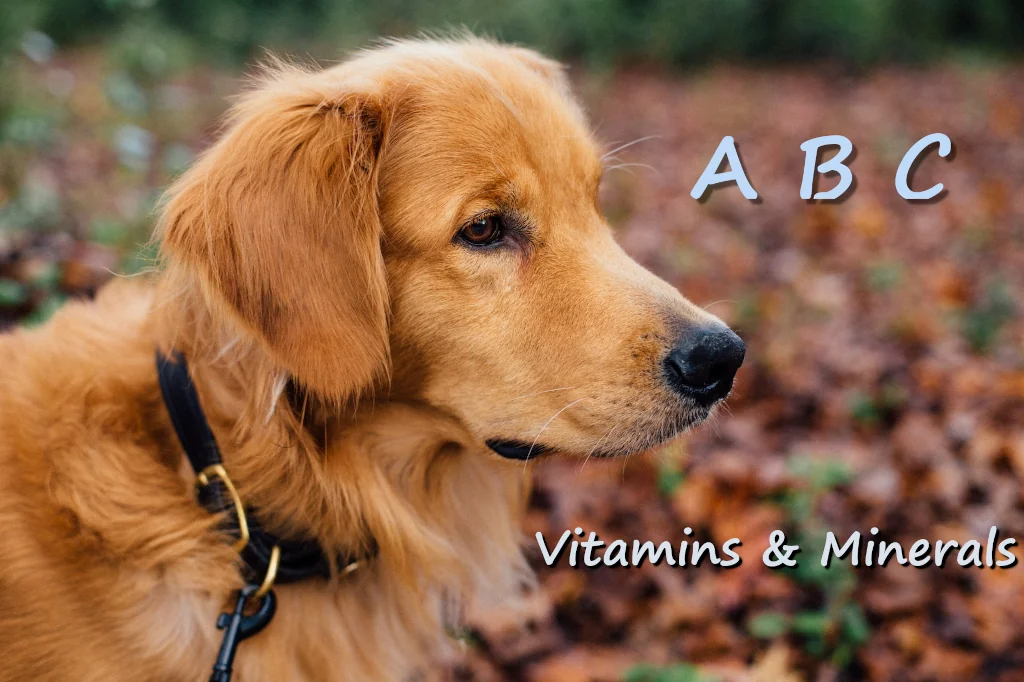Imagine knowing exactly what nutrients your dog needs and why.
Picture the peace of mind that comes with that knowledge. That’s what we’re here for. This guide will break down the essential vitamins and minerals for dogs, their roles, and how to ensure your furry friend is getting enough.
We’re about to dive into the world of canine vitamins and minerals, exploring their importance, showing your which ones your dog needs, the signs of deficiency, and how to ensure your dog is getting all the nutrients they need. So, let’s dive in, shall we?

Why Are Vitamins and Minerals Crucial for Your Dog’s Health?
Vitamins and minerals are the unsung heroes of your dog’s health. They play a multitude of roles in your dog’s body, from aiding digestion and boosting the immune system to promoting healthy skin and coat.
Vitamins, such as A, B, C, D, E, and K, are involved in various bodily functions. For instance, Vitamin A supports vision and immune health, B vitamins aid in energy production, and Vitamin D helps regulate calcium and phosphorus, essential for bone health.
Minerals like calcium, phosphorus, potassium, and magnesium are equally important. They’re involved in bone formation, nerve function, fluid balance, and even the transportation of oxygen in the blood.
In essence, vitamins and minerals are the building blocks of your dog’s health. Without them, your dog’s body wouldn’t function properly. But like all good things, balance is key. Too little can lead to deficiencies, while too much can cause health problems.
What Are the Most Important Vitamins for Your Dog?
While all vitamins play a crucial role in your dog’s health, some are particularly vital. Let’s explore each of them in detail, highlighting their sources and recommended daily intake.
Vitamin A
Essential for vision, growth, immune function, and fetal development. It also helps maintain the health of skin and coat.
Vitamin A, often found in liver, fish oil, eggs, and various dairy products, is crucial for your dog’s health. Including these foods in your pet’s diet will help fulfill their Vitamin A requirement. For instance, feeding your dog a small piece of beef liver (approximately 30g) once or twice a week would provide a sufficient amount of Vitamin A.
For adult dogs, the Association of American Feed Control Officials (AAFCO) recommends a daily intake of 5,000 IU per kilogram of diet, fed on a dry matter basis.
Caution: Vitamin A in excess can cause dehydration, joint pain, and can even harm your dog’s blood vessels. While Vitamin A is necessary for your dog’s diet, feeding them large amounts of liver, a vitamin A-rich food, regularly, can potentially lead to toxicity.
B Vitamins (B1, B2, B3, B5, B6, B12)
B Vitamins are involved in energy production, enzyme function, brain function, and blood cell formation. They also aid in reducing inflammation.
B vitamins are plentiful in whole grains, yeast, milk, eggs, meat, and fish. Including a balanced variety of these foods in your dog’s meals can help ensure an adequate intake of B vitamins. For instance, serving a cup of cooked brown rice alongside a protein source like chicken can create a healthy, balanced meal rich in B vitamins.
As for the recommended daily intake, it varies for different B vitamins. The AAFCO recommends, for example, a minimum of 2.25 mg/kg of Vitamin B1 (Thiamine) and 1.5 mg/kg of Vitamin B6 (Pyridoxine) in your dog’s diet.
Vitamin C
Vitamin C is an antioxidant that helps combat harmful free radicals and supports the immune system.
Although dogs can produce Vitamin C in their bodies, additional sources can be beneficial, especially under stress or illness. This vitamin is abundant in fruits and vegetables like broccoli, spinach, and apples. Small portions of these can be a great addition to their regular meals.
The precise requirement of Vitamin C for dogs isn’t established. However, around 18 mg of vitamin C per pound of your dog’s body weight per day should be adequate for most healthy adult dogs.
For an adequate Vitamin C intake, incorporating a cup of chopped broccoli, spinach, or half a medium-sized apple into your dog’s diet can provide around 40-50 mg of Vitamin C.
Vitamin D
Vitamin D is crucial for bone and muscle health as it helps regulate calcium and phosphorus absorption.
Vitamin D is mainly obtained through sun exposure, but it can also be found in fish and fortified foods. Fish oil supplements can also be a reliable source of Vitamin D. Feeding your dog a small portion of salmon (around 100g) once or twice a week can be an excellent source of Vitamin D.
However, because Vitamin D is fat-soluble and stored in the body, excess intake can be toxic. Therefore, it’s vital to consult with a vet for proper dosage. AAFCO recommends 500 IU per kg of diet on a dry matter basis for adult dogs, or about 125IU per 1,000 kcal.
Caution: Vitamin D is another one to watch. Too much can result in bone deformity, calcification of organs, or even kidney failure. It’s often found in human supplements and certain rat poisons, making it crucial to keep such items out of your dog’s reach.
Vitamin E
An antioxidant that protects body cells from damage and supports heart health. Vitamin E can be found in leafy green vegetables, certain fruits (like avocado and pumpkin), and in vegetable oils.
Consider adding these foods or a Vitamin E supplement to your dog’s diet after discussing with your vet.
For Vitamin E, the AAFCO recommends a daily intake of 50 IU per kilogram of diet, or about 12.5 IU per 1,000 kcal.
Caution: Vitamin E in excess can interfere with the absorption and use of vitamins A and K. It might also cause a decrease in thyroid hormones. Too much of anything can be harmful, and Vitamin E is no exception.
Vitamin K
Vitamin K plays a vital role in blood clotting and wound healing.
Sources of vitamin K include leafy green vegetables, broccoli, and Brussels sprouts. This vitamin is also produced by the good bacteria in your dog’s gut. Including leafy greens in your dog’s diet can help ensure they’re getting enough Vitamin K.
Specific daily requirements for Vitamin K aren’t established for dogs, but feeding a varied, balanced diet should provide sufficient amounts. Do not add Vitamin K to your dog’s diet unless the diet contains more than 25% fish on a dry matter basis.
Caution: Vitamin K toxicity is rare but can interfere with blood clotting and lead to anemia if consumed in large amounts.
Remember, while it’s important to ensure your dog gets these essential vitamins, it’s equally crucial to provide them in the right amounts. Overdosing on vitamins can be just as harmful as a deficiency, but we’ll get to that later.
Which Minerals Are Important for Your Dog?
Just like vitamins, minerals play a significant role in your dog’s health. Here are some of the key minerals your dog needs. Note: Unless otherwise stated, pregnant/nursing dogs and puppies require about the same amount of the specific mineral as adult dogs.
Calcium and Phosphorus
These two minerals work together to build strong bones and teeth. They’re particularly important for puppies and lactating mothers.
Calcium and Phosphorus are mainly found in bones and dairy products. Therefore, a teaspoon of bone meal or a raw bone (under supervision) can be a good source, as can dairy products in moderation.
The AAFCO recommends Calcium and Phosphorus at a ratio of 1:1 to 2:1, with total Calcium of 1.25 g per 1,000 kcal and Phosphorus of 1 g per 1,000 kcal in an adult dog’s diet. Nursing/pregnant dogs and puppies require 2.5x this amount.
Potassium
Potassium is essential for maintaining fluid balance, nerve function, and muscle activity.
Potassium is found in a variety of foods, including meat, vegetables, and grains. Foods such as sweet potatoes, bananas, and white potatoes can provide a natural source of potassium.
The AAFCO recommends 1.5 g (1500 mg) of potassium per 1,000 kcal in an adult dog’s diet.
So, including a half-cup of sweet potato, or a small banana in your dog’s diet can help meet their potassium needs.
Magnesium
This mineral is involved in nerve function, muscle movement, and the absorption of vitamins and minerals. Magnesium is abundant in whole grains, green leafy vegetables, and dairy products.
The AAFCO suggests a minimum of 150 mg (0.15g) of magnesium per 1,000 kcal for adult dogs.
Therefore, adding about a cup of cooked spinach to your dog’s meals, once or twice a week can ensure they get adequate Magnesium.
Zinc
Zinc is crucial for skin health, immune function, and thyroid health.
It is found in meats, fish, poultry, whole grains, and some vegetables. Foods like beef, lamb, and pumpkin seeds are excellent sources of zinc.
The AAFCO recommends a minimum of 20 mg of zinc per 1,000 kcal in an adult dog’s diet. Pregnant/Nursing dogs and puppies require about 25 mg.
Per that recommendation, serving of beef or lamb (around 100g) can be a rich source of zinc. However, it’s crucial to balance zinc intake with other nutrients, especially copper. A small amount of cooked liver or whole grains can help balance the intake of these two nutrients.
Iron
Iron is involved in the production of red blood cells, which carry oxygen around the body.
Iron is present in meat, especially organ meat like liver and heart. So try to include these in your dog’s diet, as it can be beneficial. Fish and poultry also contain iron but in lesser amounts.
The AAFCO recommends about 10 mg of iron per 1,000 kcal in an adult dog’s diet. Puppies and pregnant/nursing dogs require a bit more iron per 1,000 kcal, about 22 mg.
Selenium
Selenium works with Vitamin E as an antioxidant to help protect body cells from damage.
Selenium is found in fish, meats, and grains. Foods such as tuna, turkey, and brown rice can contribute to your dog’s selenium intake.
The AAFCO recommends a minimum of 0.09 mg for every 1000 calories or about 0.35 mg of selenium per kg of food.
While these minerals are essential, they need to be provided in the right balance. Too much or too little can lead to health problems. Always consult your vet or a pet nutritionist to ensure your dog’s diet meets their mineral needs.
How to Tell if Your Dog Is Vitamin or Mineral Deficient?
Just like us, our furry friends can also suffer from vitamin and mineral deficiencies. These deficiencies can manifest in various ways, depending on which specific nutrient your dog is lacking. Here, we’ll list some common signs of deficiency.
Change in Appetite or Weight. Dogs with nutrient deficiencies often show changes in appetite – they could either eat less than usual or exhibit an unusual increase in hunger. Unexplained weight loss, even with a normal appetite, may also be a sign of a nutrient deficiency.
Skin and Coat Issues. A dull coat, dry skin, or excessive shedding can be a symptom of certain nutrient deficiencies, such as lack of essential fatty acids, zinc, or vitamins A and B.
Behavioral Changes. If your dog suddenly seems lethargic, irritable, or less interested in activities they usually enjoy, they may be deficient in essential vitamins and minerals. Nutrients such as B-vitamins have a substantial impact on a dog’s energy levels and mood.
Digestive Problems. Persistent digestive issues like diarrhea or constipation might indicate a deficiency in certain nutrients like fiber, vitamin B12, or potassium.
Slow Healing or Frequent Illness. If your dog gets sick often or has wounds that take a long time to heal, it could be due to a deficiency in vitamins such as vitamin C, A, or E, which are crucial for immune health and wound healing.
These signs should not be ignored. However, they can also be symptoms of other health issues, not just nutrient deficiencies. If you notice any of these signs, it’s essential to consult with a veterinarian for a proper diagnosis and treatment plan.
Do Dogs Need Vitamin and Mineral Supplements?
In an ideal world, a balanced, high-quality diet would provide all the vitamins and minerals your dog needs.
However, the reality is that every dog is unique, with unique nutritional needs. This complexity is due to factors like breed, age, size, activity level, and overall health status.
For example, a senior dog might benefit from extra glucosamine and chondroitin for joint health, while a highly active breed may require more B-vitamins to help convert food into energy. While most commercial dog foods are formulated to be complete and balanced, not all dogs digest and absorb nutrients the same way.
So, some dogs might benefit from certain supplements to fill nutritional gaps. But remember, supplements should be just that – a supplement to a balanced diet, not a replacement. Over-supplementation can lead to toxicity, particularly with fat-soluble vitamins like A, D, E, and K.
Before starting any supplements, it’s important to consult with your vet. They can recommend the best options based on your dog’s individual needs and monitor for any potential side effects.
FAQs
What vitamins do dogs need in homemade food?
Dogs need a balance of vitamins A, B, C, D, E, and K in their homemade food, along with essential minerals like calcium, phosphorus, and iron.
What vitamins do dogs usually lack?
Dogs commonly lack Vitamin A and E, particularly if on a low-fat diet, and B-vitamins if their diet lacks variety.
Are there risks to giving my dog too many vitamins?
Excessive vitamins, particularly A, D, E, and K, can lead to toxicity causing health issues from bone deformity to anemia. Always consult with a vet before starting any supplement regimen.
Alex, a passionate animal lover, has experience in training and understanding animal behavior. As a proud pet parent to two dogs and three cats, he founded AnimalReport.net to share insights from animal experts and expand his knowledge of the animal kingdom.




